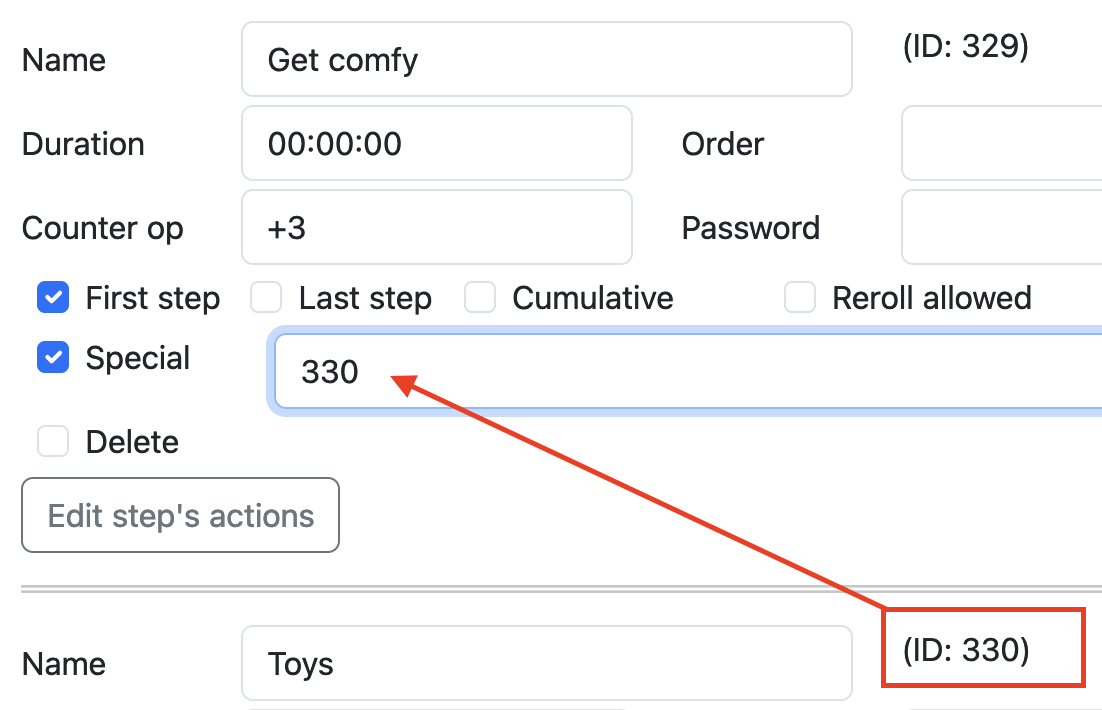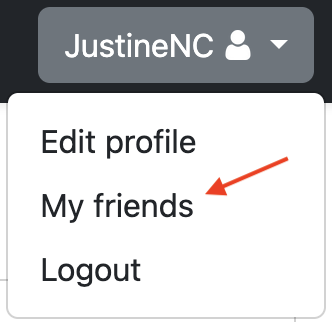Documentation
Concept
A game is made of steps. At each step one of the associated actions is selected. You must follow the instructions of both the steps and the selected action. Some steps and actions have a timer. You will be able to go to the next step only at the end of the timer or if you cancel the timer (that's cheating though).
Special steps can be reached at any moment.
Have fun !
Find a game
Recent
Recent games are displayed on the front page.
Search
To find a game that truly corresponds to you, head to the search in the top menu bar. Type a few keywords, or leave it blank, and click Search. You will be brought to the search form and the corresponding results.
Favourites and creations
Games you favourited or that you created are accessible in the search. There are corresponding buttons in your profile and in the menu bar too.
Start a game
Click Start on a game card on the front page or in the search results. Alternatively, click Start on a game summary page.
Details about a game
The summary page of each game provides a description, information about the author, the objects and a picture. In addition, one can reveal the details of all the steps and actions.
Counter
Some games rely on a "counter". These games can only be played by logged in people for technical reasons. At each step the counter is updated (e.g. +1, -2, =100) and displayed. For the time being, it does not influence the game in any ways but you can refer to it in your actions or step (e.g. "if the counter is 0 then do X").Create a game
You need an account to create a game. Click on the corresponding menu item.
A game can be represented as a diagram such as this one:

Either pay for the image or make it yourself, e.g. with AI.
Game options
When creating a game or editing a game, you will have these options:- Title
- Short, catchy, title for your game. 30 characters max.
- Summary
- Short summary. 180 characters max.
- Tags
- Add tags as you wish to help users search for your game.
- Objects
- List, comma separated, of objects needed or optional for this game.
- Target audience(s)
- Indicates which people this game is intended to.
- NSFW
- Indicates that it is a Not Safe For Work game.
- Published
- Check this option once your game is ready to be used.
- Hide details
- On the summary page of a game, the user won't be able to preview the game.
- Let user pick the action
- If enabled, the users will be able to pick the action instead of having one randomly picked for them.
- Image
- An image to illustrate the game. It will also be used for steps without specific images
- Text
- Give more details about your game. You can use markdown.
Add steps and actions
To edit a game, click on the corresponding button in the summary page or on the game card.
To edit/add/remove steps use the button "Edit steps". You can add more steps by clicking "Add more". To delete a step check the box called "delete".
To edit/add/remove actions use the button "Edit actions (for step xxx)". By picking the step in the drop down list, you will access the corresponding actions.
Refer to the section "Excel import" for the details of the fields.
Special
A special> step is a step that is reachable by potentially any other step. It does not require an action to reach it.
To mark a step as "special", tick the checkbox "Special" in the step edition form. If the special step must only be reachable from some steps but not others, list these steps in the textfield next to it. Beware that the list is comma-separated and must contain the IDs of the steps. To find out the ID of a step, look it up in the form (see image below). If you just created the step, there won't be an ID: save the form and come back to it
 Limitation: The IDs specified in an excel sheet must match the real ID, not the one you set yourself
when creating a step.
Limitation: The IDs specified in an excel sheet must match the real ID, not the one you set yourself
when creating a step.
Counter
Each game has a variable called "counter" associated with it. In most games you won't need it. It might be useful though if you want to make sure that a step is played X times or if people can get out of a game only when they got a number of points. At the moment the counter cannot be used to enable/disable actions and steps, thus the text of the action or step must state for example "Do this if counter is at zero otherwise reroll". For each step you can specify an operation on the counter, such as "+1", "-2", "=0". If no step has these operations specified, then the game has no counter and anyone can play it. If you use them, even in a single step, the game requires users to be logged in to play. This is a technical limitation at the moment as we store the counter in the database. The counter is shown on each step.Excel and JSON import/export
It can get tedious to create all the steps and actions using the forms as described above. A better way is to use the Excel or the JSON export/import feature. On the edit page of a game, click "Download [Excel|JSON]". You can then freely edit it in Excel or in a text editor. The JSON format is also appropriate if you want to use a chatbot to help you create the game.
To add new steps and actions, use an unused value in the file.
To modify an existing step or an action, make sure to keep the index.
The columns `is_first`, `is_last`, `special` and `cumulative` are booleans: `true`, `1`, `on` or `yes` are valid.
Any input in the column/field `Delete` will cause this object to be deleted.
Step fields details:
- index
- For existing steps, keep it as it is. To add a new step, use an unused value.
- delete
- Any value in this field will cause the step to be deleted along with the associated actions.
- name
- Title of the step.
- text
- A description of the step.
- is_first
- Mark the first step in the game. If multiple steps are marked as first, one will randomly be picked.
- is_last
- Mark final step(s).
- duration
- A duration during which the progress is blocked. XL format is "HH:MM:SS". JSON format is `P[n]DT[n]H[n]M[n]S` Where the `P` introduces the period followed by the number of days. The T introduces the time part with hours, minutes, seconds.
- special
- A "special" step is a step reachable from any other step (no need for an action to reach it).
- cumulative
- Actions in such a step are cumulative, i.e. all the actions up to a random one are picked.
- reroll
- The step can be rerolled. A button will appear on this step to allow rerolling.
Action fields details:
- index
- For existing actions, keep it as it is. To add a new action, use an unused value.
- delete
- Any value in this field will cause the step to be deleted along with the associated actions.
- step (only for excel)
- The step to which this action belongs. Must match a step index (existing or new).
- order
- A field to order the actions belonging to the same step. Necessary if the step is of type "cumulative".
- Description
- Description.
- goto
- The index of the step to which we go after this action. Must match a step index (existing or new). It can be empty if the action is in the last step or a special step.
- probability
- Probability to pick this action among all the actions of this step. If none is specified, 10% by default. If the sum is not 100%, the system compute a relative percentage.
- duration
- A duration during which the progress is blocked. XL format is "HH:MM:SS". JSON format is `P[n]DT[n]H[n]M[n]S` Where the `P` introduces the period followed by the number of days. The T introduces the time part with hours, minutes, seconds.
- min_times
- Minimum number of times one must reach the step before seeing this action.
- max_time
- Maximum number of times one can reach the step before this action vanishes.
Profile and preferences
In your profile you can write a bio and upload a picture.There are also a couple of preferences:
- Show only the selected action
- If checked, you will see only the selected action at each step and not the other actions. Nice to keep a bit of mistery for future replay.
- Show the percentage of chances to select an action
- When playing, show the percentage next to each action.
- User can bypass timers
- Timers block the progress of the game until they expire. If enabled, this option lets the user bypass the timer. If you lack self-control, this is an important one.
- All steps can be rerolled
- Allows the user to reroll any step. This is cheating !
Friends
One can mark other users as _friend_. To do so click the button next to the person's name in a game summary.
To see the list of your friends, go to the User's menu at the top right:

To remove a friend, just click the same button you clicked to add it.
Messages
Players can exchange private messages. To start a discussion click on the enveloppe next to the user's name, e.g. in their profile page or in the friends' list.
In the conversation page, you can send new messages, read previous messages, or block a user. You can also delete messages but a placeholder will remain.
